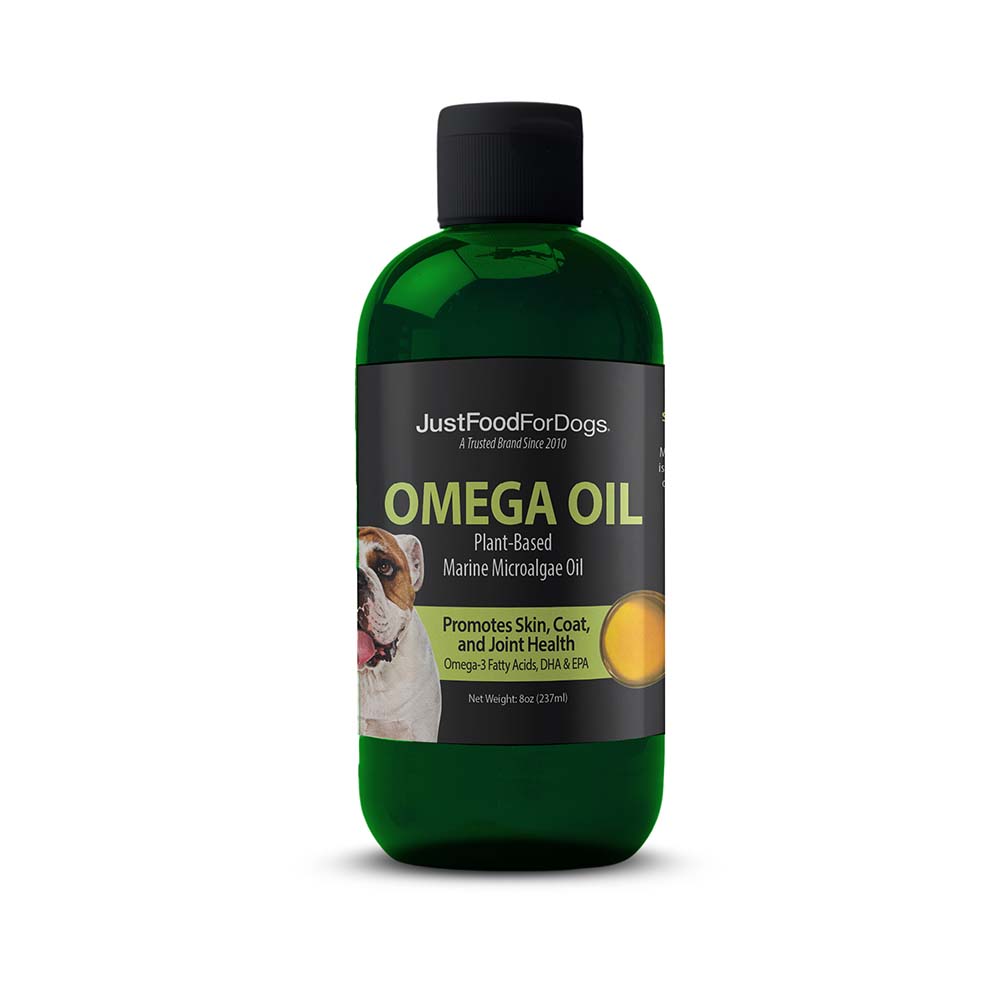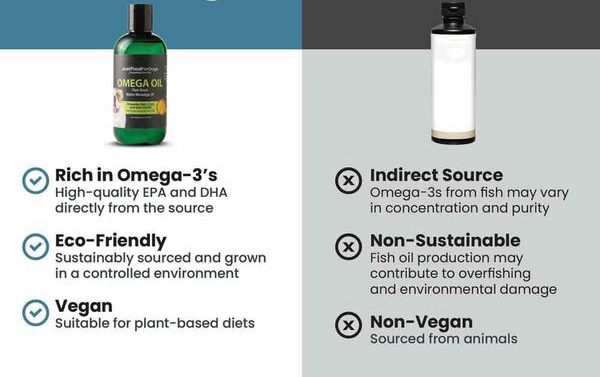Algae Oil Benefits For Dogs
Fish oil is falling out of fashion due to limited resources. Meet algae oil for dogs: a more sustainable, high-quality source of omega-3s.
You may have heard of algae oil as a great plant-based source of omega-3 fatty acids for human health. But did you know algae oil may also be a great source of nutrients for dogs? Adding algae oil to your dog’s diet is a great way to boost nutrition and increase their vitamin and mineral intake at mealtime.
What Is Algae Oil?

Algae oil, sometimes called algal oil or seaweed oil, is made by extracting oil from marine microalgae. It’s one of the best vegetarian dietary sources of nutrients that typically come from fish, and is known for being rich in other vitamins and minerals such as:
- Omega-3 fatty acids (DHA, EPA, and ALA)
- Vitamin A
- Vitamin D
- Polyunsaturated fatty acids (healthy fats)
Types of Omega-3 Fatty Acids in Algae Oil
There are three main types of omega-3 fatty acids:
Docosahexaenoic Acid (DHA), a long-chain fatty acid most often found in fatty fish like salmon or in marine plants.
Eicosapentaenoic Acid (EPA), usually found in fish and fish oil.
Alpha-Linolenic Acid (ALA), typically found in chia seeds, nuts, and flaxseed.
Algae Oil vs. Fish Oil

Algae oil provides the same benefits as fish oil supplements and is a great dietary supplement alternative for vegetarians or those who don’t eat fish. It provides just as many plant-based omega-3 fatty acids essential for maintaining heart health, eye health, a healthy immune system, and more.
Fish don’t naturally produce omega-3s or other essential fatty acids. The nutrients they contain come from eating marine algae and build up in their bodies, making them a rich source of the stuff for animals higher up the food chain.
Extracted directly from microalgae, algae oil is a 100% vegetarian and vegan omega-3 source. You can think of using algae oil instead of fish oil for dogs as skipping a step in the food chain. You’re getting your omega-3 fatty acids and other nutrients directly from the natural source.
The Sustainability Factor
Algae oil is also a more sustainable source of Omega-3s. Instead of relying on fish from the ocean, more algae can be grown without negatively impacting the environment or shared ecosystems. This also avoids the negative effects of overfishing and heavy metal contaminants from ocean pollution. Fish oil can accumulate toxins like mercury and PCBs, posing health risks if not properly purified. This is less of a risk with algae because it is grown in a controlled environment.
In addition to its bioavailability, JustFoodForDogs switched the source of its omega-3 oil from fish oil to algal oil supplement for this very reason.
Is Algae Oil Good For Dogs?

Algae oil is a rich source of essential minerals and healthy fats for dogs. It has almost no flavor making it easy to add to any canine diet.
It’s also highly bioavailable, meaning its active ingredients are utilized by the body more effectively. This way it provides high-quality nutritional support to promote and maintain healthy skin and coat.
Dogs can’t produce these essential fatty acids on their own. As such, supplementing your dog’s diet with algae oil is a great way to add important nutrients.
Health Benefits of Omega-3 Fatty Acids For Dogs
We mentioned that algae oil has health benefits for dogs, but how exactly do the omega-3s in algae oil support your dog’s health and wellness? Here are the major benefits of omega-3 fatty acid supplementation for dogs.
Supports Immune Function
Different compounds in microalgae stimulate the immune system and help fight different pathogens that try to enter the body. Omega-3 fatty acids are linked to properties that support a healthy immune response.
Helps Maintain Skin & Coat Health
Dogs who get plenty of the healthy fats found in omega-3s tend to have healthier skin and coats. A diet rich in omega-3s may support skin health and provide support for animals with sensitive skin.
Supports Eye Health
Research has shown that the omega-3s in algae oil can help improve eye health. Specifically, it slows down how fast tears in the eye evaporate to alleviate dry eyes. The compounds EPA and DHA may also help age-related macular degeneration (issues with the retina in the eye) by supporting eye function.
Supports Cardiovascular Health
In addition to helping maintain a normal inflammatory response, both EPA and DHA (the two main types of omega-3 fatty acids) support normal blood pressure and heart rate in dogs, normal cardiovascular function, and may also lower triglycerides, a type of fat or lipid in the blood.
Boosts Cognition
Omega-3 fatty acids, particularly DHA, are essential for brain development and brain function in humans, particularly in developing infants. Omega-3 supplements like algae oil can also help support cognitive function in dogs.
Helps Memory
Another way that algae oil supports brain health in dogs is by supporting normal nerve conduction and memory recall. Omega-3-rich diets may enlarge the hippocampus, a key brain region for learning and memory.
Helps Support a Healthy Inflammatory Response
The essential fatty acids found in algae oil can work as a powerful antioxidant and may help relieve inflammation associated with normal daily exercise and activity.
Ways to Add Algae Oil to Your Dog’s Diet
- Supplements – algae oil in the form of liquid which can be added to pet food or given as drops.
- Soft Gels – made with algae oil and a coating that dissolves easily when eaten with dog food.
- Oil Capsules – capsules made with algae oil or algae powder that you’d give to your dog like any other medicine.
- Algae Powder – the powder form of algae oil can be sprinkled over dog food or added to homemade dog treats.
Are There Side Effects to Algae Oil?
When adding algae oil to your dog’s diet, more often than not the biggest issues you might deal with are fishy burps or mild stomach symptoms. A study reviewed by the National Institute of Public Health found that there were no effects from any dose of algae oil given to dogs that required treatment.
Overall, algae oil emerges as a preferable option due to its sustainability, purity, direct omega-3 content, suitability for various dietary preferences, and consistent quality. As consumer awareness grows about environmental impact and health considerations, algae oil stands out as a more responsible and effective choice compared to fish oil.
Other Good Sources of Omega-3s for Dogs

Salmon and Cod
Oily fish like salmon, mackerel, anchovies, sardines, and cod contain a healthy amount of omega-3 fatty acids and vitamin D. Salmon oil and the like are also an excellent source of protein, and rich in essential minerals for dogs’ diets like magnesium, potassium, and iron. JustFoodForDog’s sweet potato and fish recipe is made with cod and fresh, nutritious veggies and is full of omega-3s.
Crab and Lobster (de-shelled)
These crustaceans are great sources of lean protein. They pack a punch of vitamin B12 for brain function, omega-3 fatty acids, and amino acids to support healthy skin and nails as well as muscle growth in dogs.
Mussels, Oysters, and Shrimp
Another rich source of omega-3 fatty acids, minerals, vitamins, amino acids, and antioxidants that help support a healthy inflammatory response in dogs. Shellfish like mussels, oysters, and shrimp also have lots of vitamin B12, protein, iron, zinc, calcium, phosphorus, and selenium.
Flaxseed and Soybean Oil
Flaxseed and soybean oil are full of omega-3s that support normal blood pressure. Adding flaxseed or soybean oil to your dog’s diet may help maintain normal kidney function, too!
Citations
Dahms, Irina, Eileen Bailey-Hall, Erin Sylvester, Audrey Parenteau, Shiguang Yu, Alexios Karagiannis, Franz Roos, and Jon Wilson. 2019. “Safety of a Novel Feed Ingredient, Algal Oil Containing EPA and DHA, in a Gestation-Lactation-Growth Feeding Study in Beagle Dogs.” Edited by Juan J Loor. PLOS ONE 14 (6): e0217794. https://doi.org/10.1371/journal.pone.0217794.
Hodge, W., D. Barnes, H. M. Schachter, Y. Pan, E. C. Lowcock, L. Zhang, M. Sampson, et al. 2005. Effects of Omega-3 Fatty Acids on Eye Health: Summary. Www.ncbi.nlm.nih.gov. Agency for Healthcare Research and Quality (US). https://www.ncbi.nlm.nih.gov/books/NBK11888/.
Riccio, and Lauritano. 2019. “Microalgae with Immunomodulatory Activities.” Marine Drugs 18 (1): 2. https://doi.org/10.3390/md18010002.
Sansom, Will. 2022. “Study Links Omega-3s to Improved Brain Structure, Cognition at Midlife.” UT Health San Antonio. October 5, 2022. https://news.uthscsa.edu/study-links-omega-3s-to-improved-brain-structure-cognition-at-midlife/.
This content is for informational use only and does not replace professional nutrition and/or medical advice, diagnosis, or treatment. Do not substitute for or rely on for specific nutrition and/or medical recommendations. Please talk with your veterinarian/DVM about any questions or concerns.








